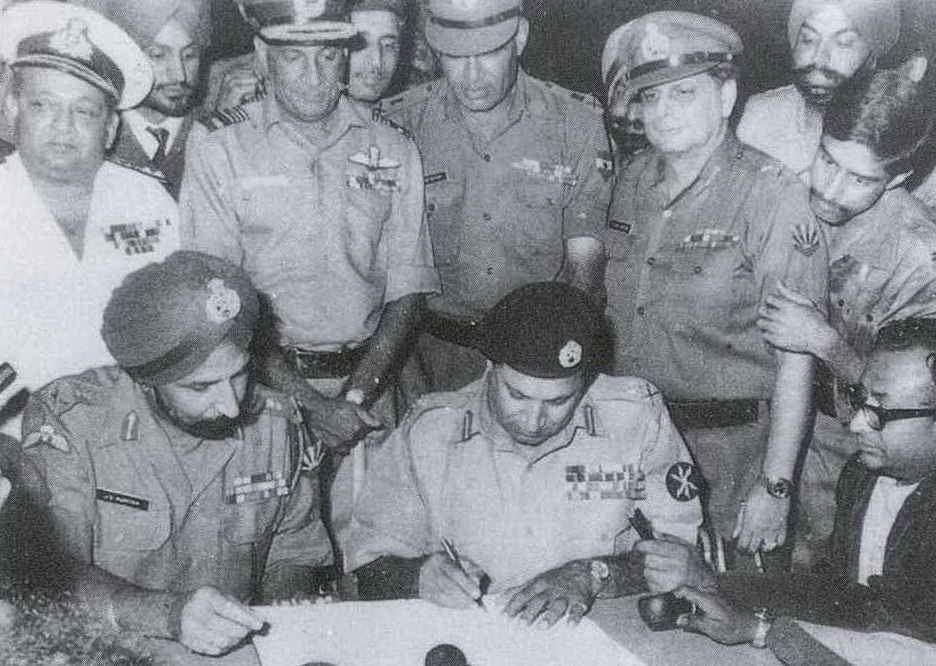The Liberation War of 1971 which furnished the formation of Bangladesh after defeating Pakistan in an almost three weeks long brawl, is certainly one of the greatest victories in modern history. It is not a usual instance where a country of a big strategical and global political importance like India, incorporates an army of rebels absconded from a land of atrocities and trains them inside its territory and anchors an attack to protect civil and human rights. The official war bugles may have been blown at the midnight of 4th December, but the preparations and training coupled with the cinders of vengeance have been burning since forever. Nevertheless, the war was curtained down on 16th December with India emerging as victors and the foundation stone for Bangladesh was laid. It is in this regard that Vijay Diwas is celebrated on 16th December to pay homage to all the soldiers who defended the nation.
Why does India celebrate Vijay Diwas
the 1971 Liberation War witnessed the biggest-ever military surrender after the second World War. After a two-week long brawl, the chief of the Pakistani forces, General Amir Abdullah Khan Niazi surrendered to the joint forces of Indian Army and Bangladesh’s Mukti Bahini, along with 93,000 Pakistani troops. Pakistan had no other option but to sign the ‘Instrument of Surrender’ and leave the eastern province, only to shape the destiny of the current Bangladesh. With numerous active and covert operations launched by India in close association with the Mukti Bahini forces, Pakistan’s troops – air, water and land were crippled all at once. The aggressive stance embodied by the Indian Military and later reflected onto the Bangladeshi rebel force, not only won them the war but also laid the foundation of militaria agencies for Bangladesh. For instance, Operation Kilo-Fight that involved both seasoned and unskilled fighter pilots, laid the cornerstone for the organised Bangladesh Air force. The aims and agendas of both the countries – India and Bangladesh were intertwined and therefore, both the countries, even fifty years later, celebrate the victory day in their own respective spirits. While one rejoices in remembrance of attaining independence and sovereignty, the other beats the drums of victory and bows with gratitude for the defence.
History of the War
The war was a consequence of the atrocities inflicted by Pakistani governance and military onto the Bangla sect of people living in the eastern province. The atrocities were reacted by an uprising rebellion in East Pakistan against the notorious and inhumane Islamabad government. The people belonging to the Bengali ethnicity were subjected to horrendous abuse and atrocities by the Pakistan Armed Forces. The eastern province of Pakistan witnessed one of the gruesome events of massacre and chaos as more than 3 million people were killed during 1971, as per the Bangladesh Government.
It was only then, that the Indian government helmed by the former Prime Minister Indira Gandhi decided to intervene and provided refuge to the escaped Bangla migrants and even ordered the Indian Army to train, arm and guide the inexperienced rebel force against Pakistan. It is estimated that around 8-10 million people left the country and sought refuge in various parts of the world.
Significance of the Military Coalition between India and Bangla Rebel Forces
There was only so much that could be done and acted behind the stage. Indira Gandhi spared no effort in voicing and mobilising global support from eminent countries. But the stage was set for the military personnel to tear off their defensive war-chest and attack from a more aggressive forefront. In consequence of the aggressive notion, several operations were launched by the Indian Military along with Mukti Bahini. Operations Trident and Python were the foremost operations which were launched in retaliation to the Pakistani Air force setting Indian air fields ablaze. The two operations broke the camel’s back and gave the Indian army the much-needed momentum. The attacks paved way for Operations Kilo-Fight and Jackpot involving both air and maritime attacks, resulting in Pakistan Navy withdrawing their Ships from the sea after the exponential damage inflicted on the Karachi harbour. As soon as Pakistan withdrew their ships, the Indian army sustained the momentum and cornered the enemy troops from all the fronts which eventually led to one of the greatest military surrenders.
What Makes This Year Special?
16th December 2021 marks the golden jubilee of the war. Therefore, in order to pay homage to the martyrs of the war and commemorate the Indian Army soldiers, the fiftieth-anniversary shall be celebrated as the “Swarnim Vijay Varsh” (golden victory year). This year the celebrations shall continue for the whole year through many events. The special events would be organised pan-India wherein, war veterans from different parts of the country will be praised and commended for their bravery and dauntlessness. The events would consist of band displays, seminars, exhibitions, war-equipment displays, film festivals etc.

